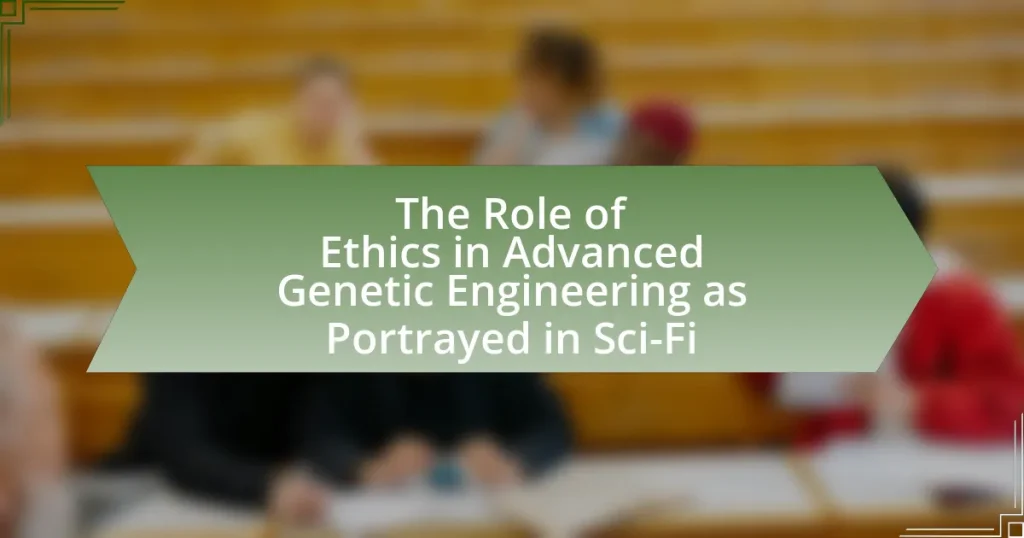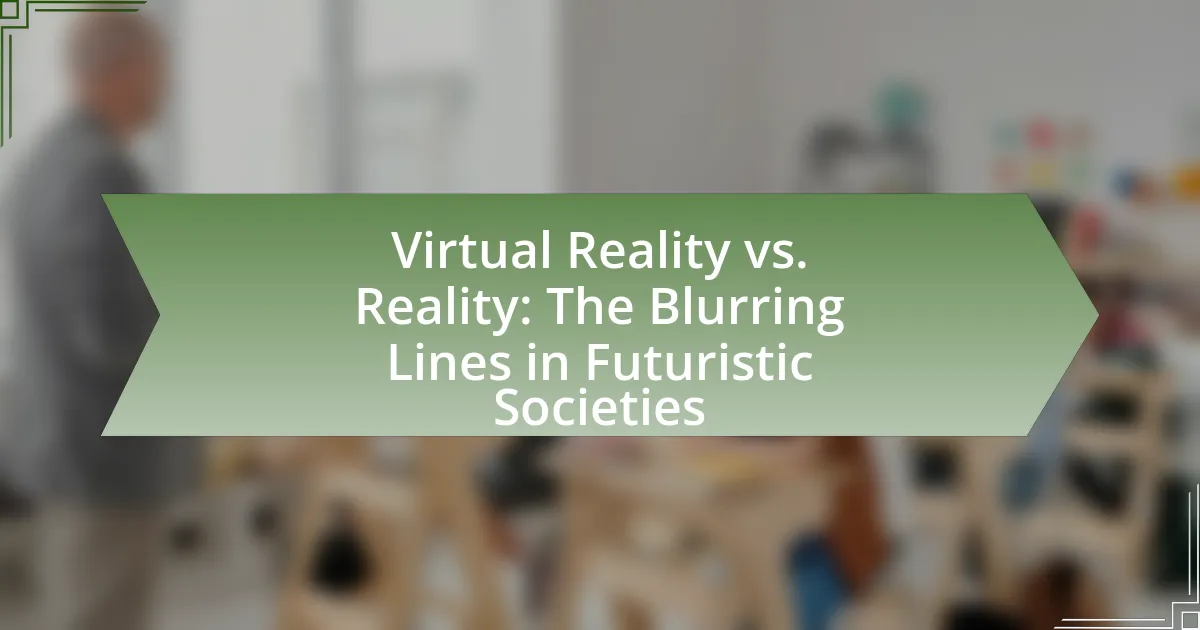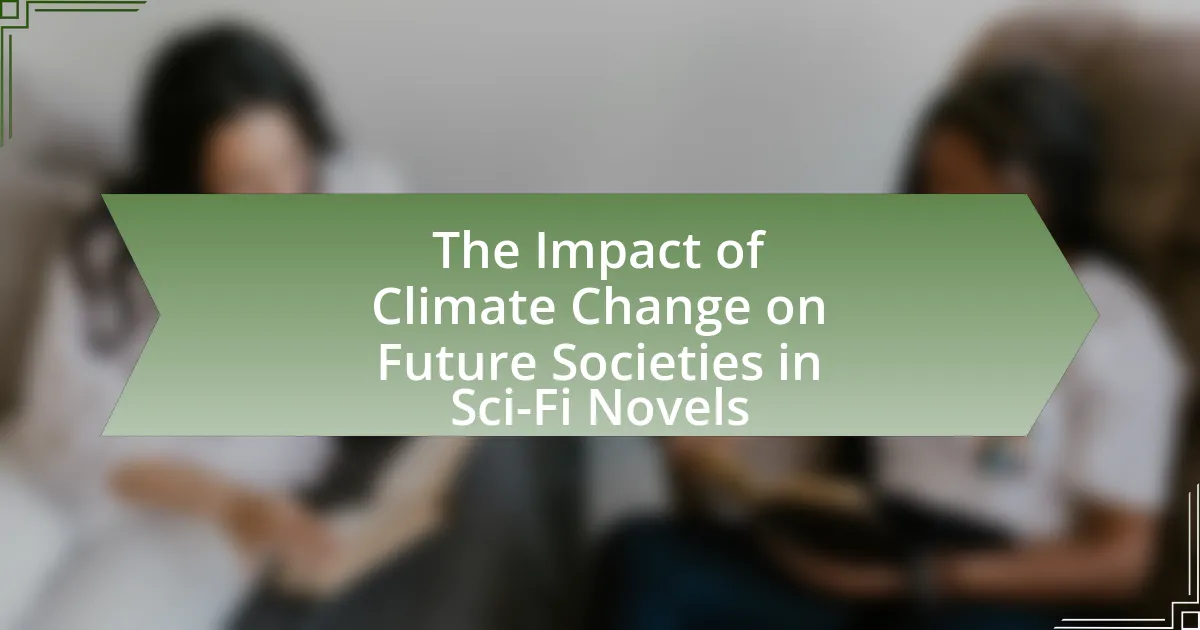The article examines the role of ethics in advanced genetic engineering as portrayed in science fiction, highlighting the moral implications and societal consequences of manipulating genetic material. It discusses how sci-fi narratives explore ethical dilemmas, such as eugenics, genetic discrimination, and the responsibilities of scientists, using examples from works like “Gattaca” and “Jurassic Park.” The article also outlines common ethical concerns, the responses of characters to these challenges, and the importance of ethical frameworks in guiding genetic research. Additionally, it addresses how cultural perspectives shape the portrayal of these ethical dilemmas and offers insights for real-world applications of genetic engineering.
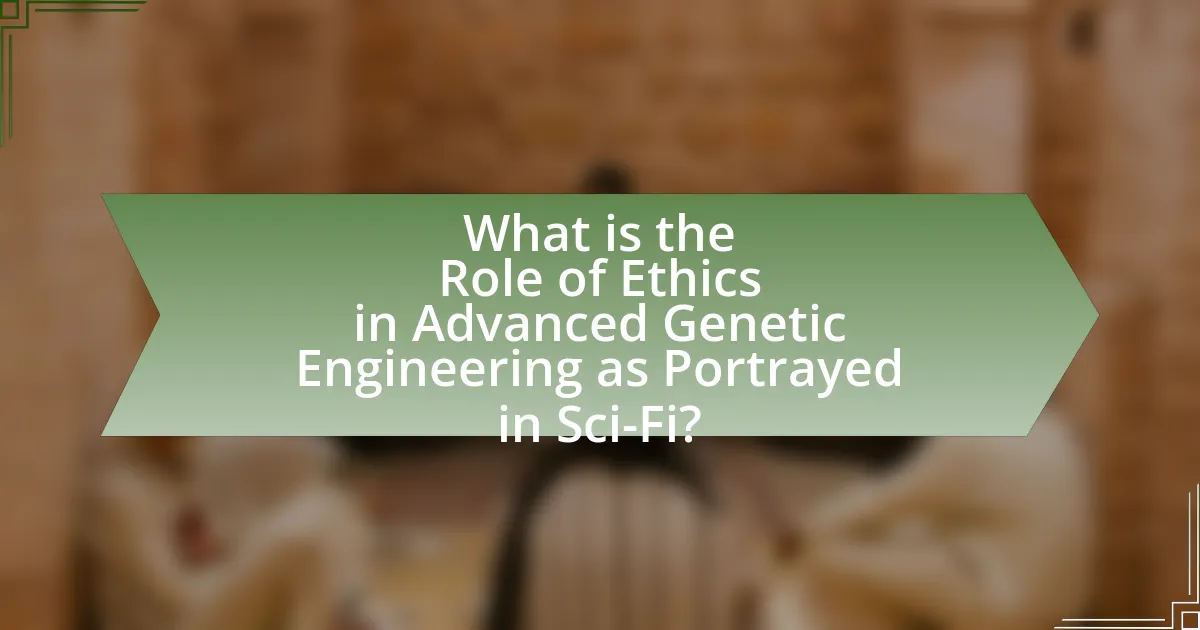
What is the Role of Ethics in Advanced Genetic Engineering as Portrayed in Sci-Fi?
The role of ethics in advanced genetic engineering as portrayed in sci-fi is to explore the moral implications and potential consequences of manipulating genetic material. Sci-fi narratives often depict scenarios where ethical dilemmas arise, such as the creation of genetically modified organisms or human enhancement, prompting discussions about the boundaries of scientific exploration. For instance, in works like “Gattaca,” the ethical concerns surrounding eugenics and genetic discrimination are central themes, illustrating the societal impact of genetic engineering. These portrayals serve to caution against unchecked scientific advancement and emphasize the need for ethical frameworks to guide genetic research and applications.
How do sci-fi narratives explore ethical dilemmas in genetic engineering?
Sci-fi narratives explore ethical dilemmas in genetic engineering by presenting scenarios that challenge moral boundaries and societal norms. These narratives often depict advanced technologies that allow for genetic manipulation, raising questions about the implications of playing God, the potential for eugenics, and the consequences of altering human evolution. For instance, in the novel “Gattaca,” the story illustrates a future where genetic discrimination is prevalent, prompting discussions about the ethics of designing humans for specific traits and the societal impact of such practices. Additionally, films like “Jurassic Park” highlight the unforeseen consequences of resurrecting extinct species, emphasizing the ethical responsibility of scientists in their pursuit of knowledge. Through these examples, sci-fi serves as a critical lens for examining the complexities and moral ramifications of genetic engineering.
What are the common ethical concerns depicted in these narratives?
Common ethical concerns depicted in narratives about advanced genetic engineering include the potential for eugenics, the implications of playing God, and issues of consent. Eugenics raises questions about the morality of selecting traits in future generations, as seen in works like “Gattaca,” where societal pressures dictate genetic desirability. The notion of playing God is explored through the manipulation of life forms, leading to debates on the natural order and the consequences of such power, as illustrated in “Jurassic Park.” Additionally, the issue of consent is critical, particularly regarding genetic modifications made to unborn children, which raises concerns about autonomy and the rights of individuals who cannot consent, a theme prevalent in “Brave New World.” These narratives highlight the complex interplay between technological advancement and ethical responsibility.
How do characters in sci-fi respond to ethical challenges in genetic engineering?
Characters in sci-fi often respond to ethical challenges in genetic engineering by grappling with moral dilemmas, showcasing a spectrum of reactions from acceptance to resistance. For instance, in works like “Gattaca,” characters confront societal implications of genetic manipulation, highlighting issues of discrimination and identity. Similarly, in “Jurassic Park,” characters face the consequences of playing god, leading to catastrophic outcomes that question the morality of scientific advancement. These narratives illustrate the tension between innovation and ethical responsibility, emphasizing the need for caution in the face of powerful technologies.
Why is ethics important in the context of genetic engineering?
Ethics is crucial in the context of genetic engineering because it guides the responsible application of biotechnological advancements. Genetic engineering has the potential to alter life forms, which raises significant moral questions about the implications of such modifications on biodiversity, human health, and societal norms. For instance, the manipulation of genes can lead to unintended consequences, such as ecological disruption or the emergence of new diseases, highlighting the need for ethical frameworks to assess risks and benefits. Furthermore, ethical considerations ensure that genetic engineering practices respect human rights and promote equity, preventing misuse that could exacerbate social inequalities. The historical context of genetic engineering, including the controversies surrounding eugenics, underscores the importance of ethical oversight to prevent harm and promote the welfare of all living beings.
What ethical frameworks are commonly referenced in sci-fi literature?
Commonly referenced ethical frameworks in sci-fi literature include utilitarianism, deontology, and virtue ethics. Utilitarianism evaluates actions based on their outcomes, often depicted in scenarios where the greatest good for the greatest number is prioritized, such as in stories exploring the consequences of genetic modifications. Deontology focuses on adherence to rules or duties, illustrated in narratives where characters face moral dilemmas regarding genetic engineering that challenge ethical principles. Virtue ethics emphasizes character and moral virtues, often seen in character-driven plots that explore the implications of genetic advancements on human identity and morality. These frameworks provide a structured approach to examining the ethical implications of advanced genetic engineering in sci-fi narratives.
How do these frameworks influence public perception of genetic engineering?
Ethical frameworks significantly shape public perception of genetic engineering by framing the technology within moral and societal contexts. For instance, narratives in science fiction often highlight ethical dilemmas, such as the potential for designer babies or unintended consequences, which can evoke fear or skepticism among the public. Research indicates that when ethical concerns are prominently featured in media portrayals, they lead to increased public apprehension about genetic engineering applications, as seen in studies like those conducted by the Pew Research Center, which found that 49% of Americans believe genetic engineering poses more risks than benefits. This suggests that ethical considerations, as depicted in sci-fi narratives, play a crucial role in influencing how society views and accepts genetic engineering technologies.
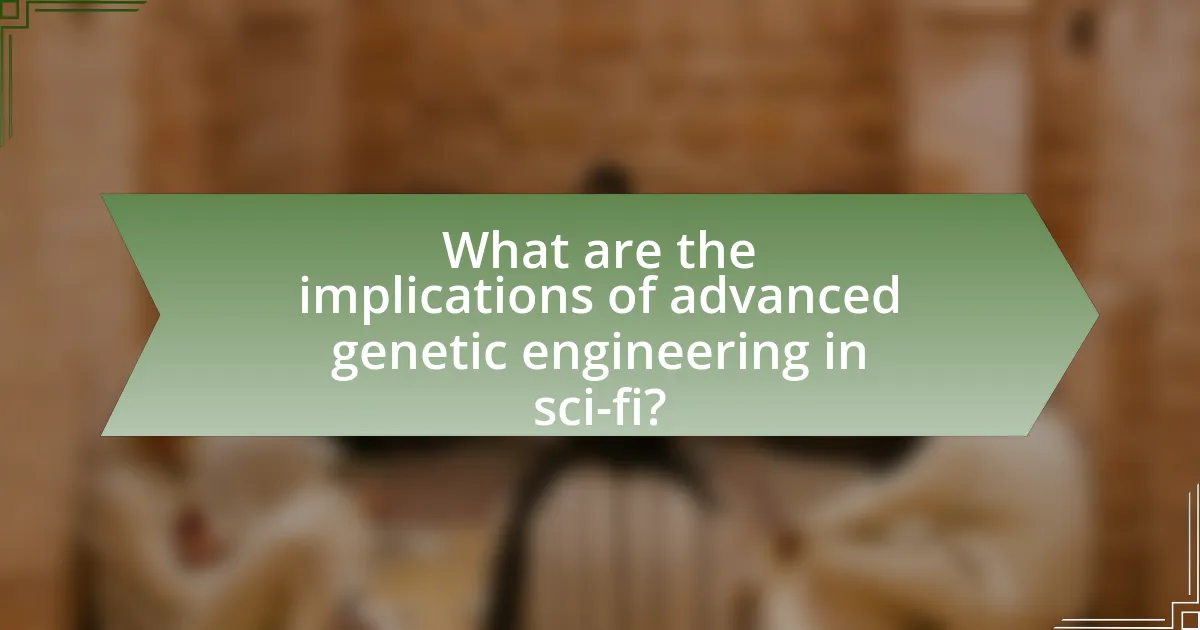
What are the implications of advanced genetic engineering in sci-fi?
Advanced genetic engineering in sci-fi often implies significant ethical dilemmas, including the potential for designer organisms and the manipulation of human genetics. These narratives frequently explore themes of identity, the definition of humanity, and the consequences of playing God, as seen in works like “Gattaca,” where genetic discrimination shapes societal structures. Additionally, the portrayal of genetic engineering raises concerns about unintended consequences, such as ecological disruption or the emergence of new diseases, reflecting real-world anxieties about biotechnological advancements. Such implications serve as cautionary tales, prompting discussions about the moral responsibilities of scientists and the societal impacts of their innovations.
How do sci-fi stories reflect societal fears about genetic manipulation?
Sci-fi stories reflect societal fears about genetic manipulation by exploring themes of loss of control, ethical dilemmas, and unintended consequences. These narratives often depict scenarios where genetic engineering leads to catastrophic outcomes, such as the creation of monstrous beings or the emergence of new diseases, illustrating public anxiety over tampering with nature. For example, in the novel “Brave New World” by Aldous Huxley, society’s reliance on genetic manipulation results in a loss of individuality and freedom, highlighting fears of dehumanization. Similarly, films like “Gattaca” showcase a future where genetic discrimination shapes social hierarchies, emphasizing concerns about inequality and the moral implications of “designer babies.” These stories serve as cautionary tales, reflecting deep-seated worries about the ethical boundaries of scientific advancement and the potential for genetic manipulation to disrupt societal norms.
What specific examples illustrate these fears in popular sci-fi works?
Specific examples illustrating fears related to advanced genetic engineering in popular sci-fi works include “Gattaca,” where genetic discrimination leads to a dystopian society prioritizing genetic perfection, and “Jurassic Park,” which showcases the catastrophic consequences of manipulating DNA to resurrect extinct species. In “Gattaca,” the protagonist struggles against a society that values genetic superiority, highlighting ethical concerns about eugenics and personal identity. In “Jurassic Park,” the chaos unleashed by genetically engineered dinosaurs emphasizes the unpredictability and moral implications of playing with nature. These narratives reflect societal anxieties about the potential misuse of genetic technology and the ethical dilemmas it presents.
How do these fears shape the narrative around genetic engineering?
Fears surrounding genetic engineering significantly shape its narrative by emphasizing ethical dilemmas and potential consequences. These fears often stem from concerns about playing God, unintended mutations, and the creation of designer organisms, which are frequently depicted in science fiction. For instance, narratives like “Gattaca” illustrate societal divisions based on genetic manipulation, highlighting fears of eugenics and loss of individuality. Such portrayals influence public perception, leading to skepticism and calls for regulation, as evidenced by surveys indicating that a majority of people express apprehension about genetic modifications in humans. This fear-driven narrative ultimately drives discussions on ethical frameworks and regulatory measures in real-world genetic engineering practices.
What potential benefits and risks are highlighted in sci-fi regarding genetic engineering?
Sci-fi highlights several potential benefits and risks of genetic engineering. Benefits often include the eradication of genetic diseases, enhanced human capabilities, and the creation of organisms tailored for specific tasks, such as environmental restoration. For instance, in the novel “Gattaca,” genetic engineering allows for the selection of desirable traits, leading to a society where individuals can achieve their full potential.
Conversely, risks depicted in sci-fi include ethical dilemmas, unintended consequences, and social inequality. Works like “Brave New World” illustrate how genetic manipulation can lead to a loss of individuality and the creation of a rigid caste system. Additionally, the potential for bioengineering to create harmful organisms or exacerbate existing societal divides is a recurring theme, as seen in “The Island of Dr. Moreau,” where the consequences of playing god lead to moral and existential crises.
How do characters weigh the benefits against the risks in these narratives?
Characters in narratives about advanced genetic engineering weigh benefits against risks by evaluating potential outcomes and ethical implications. For instance, they often consider the advantages of enhanced abilities or disease eradication against the moral dilemmas of playing God or unintended consequences. In “Gattaca,” the protagonist grapples with the benefits of genetic perfection versus the societal risks of discrimination based on genetic traits, illustrating the tension between personal ambition and ethical boundaries. This evaluation process is critical as it reflects broader societal concerns regarding the implications of genetic manipulation, emphasizing the need for responsible decision-making in the face of technological advancement.
What lessons can be learned from these portrayals about real-world genetic engineering?
Portrayals of genetic engineering in science fiction highlight the importance of ethical considerations in real-world applications. These narratives often illustrate potential consequences of unchecked scientific advancement, such as unintended genetic mutations or societal inequalities, emphasizing the need for regulatory frameworks. For instance, films like “Gattaca” depict a future where genetic discrimination leads to social stratification, underscoring the ethical imperative to ensure equitable access to genetic technologies. Such portrayals serve as cautionary tales, reminding policymakers and scientists to prioritize ethical standards and public dialogue in the development of genetic engineering practices.
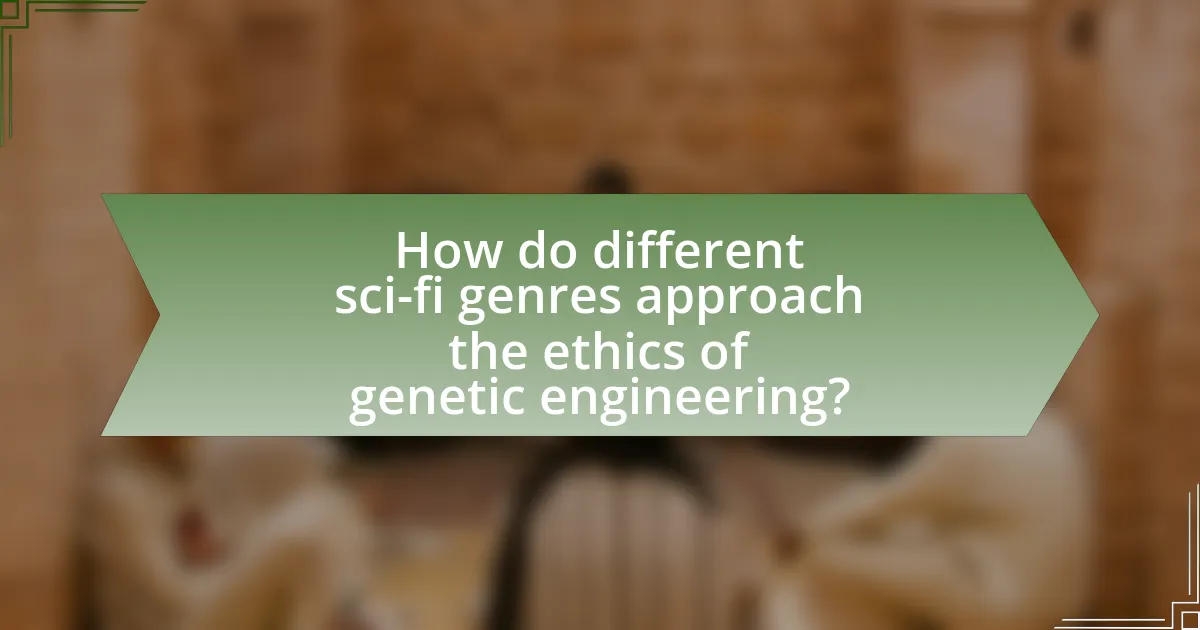
How do different sci-fi genres approach the ethics of genetic engineering?
Different sci-fi genres approach the ethics of genetic engineering by exploring diverse implications and moral dilemmas associated with the manipulation of life. For instance, dystopian sci-fi often highlights the dangers of genetic engineering, portraying societies where genetic modifications lead to inequality, loss of individuality, or authoritarian control, as seen in works like “Gattaca,” which critiques eugenics and social stratification. Conversely, utopian sci-fi tends to envision genetic engineering as a means to enhance human capabilities and eradicate diseases, suggesting a positive ethical framework, exemplified by narratives in “The Windup Girl,” where biotechnology is used for sustainability and health. Additionally, cyberpunk often delves into the intersection of technology and humanity, raising questions about identity and consent in genetic modifications, as illustrated in “Altered Carbon,” where consciousness can be transferred and bodies can be genetically engineered. These varied approaches reflect the complex ethical landscape surrounding genetic engineering, emphasizing both potential benefits and significant risks.
What are the distinctions between utopian and dystopian portrayals of genetic engineering?
Utopian portrayals of genetic engineering depict it as a means to enhance human capabilities, eradicate diseases, and create a harmonious society, emphasizing positive outcomes and ethical advancements. In contrast, dystopian portrayals highlight the potential for abuse, loss of individuality, and societal control, often showcasing genetic engineering as a tool for oppression and ethical violations. For example, in Aldous Huxley’s “Brave New World,” genetic engineering leads to a conformist society devoid of personal freedom, illustrating the dark consequences of such technology. These distinctions underscore the ethical implications of genetic engineering, reflecting societal hopes and fears regarding its impact on humanity.
How do utopian narratives envision ethical genetic advancements?
Utopian narratives envision ethical genetic advancements as a means to enhance human well-being and societal harmony. These narratives often depict a future where genetic engineering is employed to eliminate diseases, enhance physical and cognitive abilities, and promote equality among individuals. For instance, in Aldous Huxley’s “Brave New World,” genetic manipulation is used to create a stable society by controlling reproduction and ensuring that individuals are genetically predisposed to fulfill specific societal roles. This reflects the belief that ethical genetic advancements can lead to a more harmonious society by reducing suffering and promoting overall health. Additionally, works like “Gattaca” illustrate the potential for genetic advancements to create a meritocratic society, where individuals are valued based on their abilities rather than their genetic background, emphasizing the ethical implications of choice and equality in genetic engineering.
What ethical critiques are presented in dystopian scenarios?
Dystopian scenarios often present ethical critiques centered around the dehumanization of individuals, the loss of autonomy, and the moral implications of technological advancements. These critiques highlight how oppressive systems can manipulate genetic engineering to control populations, leading to a society where individual rights are sacrificed for perceived societal benefits. For example, in Aldous Huxley’s “Brave New World,” the use of genetic manipulation creates a caste system that undermines personal freedom and ethical considerations regarding human dignity. Such narratives serve as cautionary tales, emphasizing the need for ethical frameworks in the application of advanced genetic technologies to prevent exploitation and ensure respect for human rights.
How do cultural perspectives influence the portrayal of ethics in genetic engineering in sci-fi?
Cultural perspectives significantly influence the portrayal of ethics in genetic engineering in sci-fi by shaping societal values and moral frameworks that dictate how genetic manipulation is perceived. For instance, in Western cultures, individualism often leads to narratives that emphasize personal choice and the potential for human enhancement, as seen in works like “Gattaca,” where genetic engineering is portrayed as a means to achieve personal success. Conversely, collectivist cultures may focus on the implications of genetic engineering for societal harmony and the potential risks of creating inequality, as illustrated in stories like “The Windup Girl,” which critiques the commodification of genetic resources. These cultural lenses inform the ethical dilemmas presented in sci-fi, highlighting concerns such as the potential for eugenics, environmental impacts, and the moral status of genetically modified beings. Thus, the portrayal of ethics in genetic engineering within sci-fi is deeply intertwined with the cultural context from which the narratives emerge.
What role does cultural context play in shaping ethical dilemmas in these stories?
Cultural context significantly influences the ethical dilemmas presented in stories about advanced genetic engineering. Different cultures possess unique values, beliefs, and social norms that shape their perspectives on genetic manipulation. For instance, in Western societies, individualism often prioritizes personal choice and autonomy, leading to ethical debates about consent and the right to modify one’s genetic makeup. Conversely, collectivist cultures may emphasize community welfare and the potential societal impacts of genetic engineering, raising concerns about eugenics and social equity.
These cultural frameworks inform the narratives and conflicts within sci-fi stories, as seen in works like “Gattaca,” where societal pressures and genetic discrimination reflect contemporary ethical concerns. The portrayal of genetic engineering in these narratives often serves as a mirror to real-world cultural attitudes, illustrating how cultural context can create diverse ethical landscapes and dilemmas.
How do different cultures respond to the concept of genetic engineering in sci-fi?
Different cultures exhibit varied responses to the concept of genetic engineering in sci-fi, often reflecting their unique ethical frameworks and societal values. For instance, Western cultures, particularly in the United States and Europe, frequently engage with themes of individualism and innovation, leading to a more optimistic view of genetic engineering as a means to enhance human capabilities and address health issues. In contrast, cultures in East Asia, such as Japan and China, may emphasize collectivism and harmony, resulting in a more cautious approach that raises concerns about the potential societal implications and ethical dilemmas of genetic manipulation.
Evidence of these cultural perspectives can be seen in popular sci-fi works; for example, the Japanese anime “Ghost in the Shell” explores the integration of technology and humanity, reflecting societal anxieties about identity and ethics, while American films like “Gattaca” highlight the tension between genetic determinism and personal choice. These narratives illustrate how cultural contexts shape the discourse around genetic engineering, influencing public perception and ethical considerations in each society.
What practical insights can be drawn from the ethical discussions in sci-fi about genetic engineering?
Ethical discussions in sci-fi about genetic engineering highlight the importance of consent, the potential for inequality, and the unforeseen consequences of altering human genetics. These narratives often illustrate that informed consent is crucial, as characters frequently face dilemmas regarding the autonomy of individuals whose genes are modified. For instance, in “Gattaca,” the implications of genetic selection raise questions about the rights of those born naturally versus genetically engineered individuals, emphasizing the risk of societal division based on genetic traits. Additionally, sci-fi often explores the unintended consequences of genetic manipulation, as seen in “Jurassic Park,” where the resurrection of extinct species leads to ecological disasters, underscoring the need for careful consideration of long-term impacts. These insights suggest that ethical frameworks must be established to guide genetic engineering practices, ensuring equitable access and minimizing risks to society and the environment.
How can these insights inform real-world ethical guidelines in genetic research?
Insights from science fiction regarding advanced genetic engineering can inform real-world ethical guidelines by highlighting potential societal impacts and moral dilemmas associated with genetic manipulation. For instance, narratives that explore the consequences of genetic enhancements often emphasize the importance of consent, equity, and the potential for discrimination based on genetic traits. These themes can guide policymakers in establishing regulations that prioritize informed consent and equitable access to genetic technologies. Historical examples, such as the ethical debates surrounding the Human Genome Project, illustrate the necessity of addressing these concerns to prevent misuse and ensure that genetic research benefits all segments of society.
What best practices can be adopted from sci-fi narratives to address ethical concerns?
Best practices that can be adopted from sci-fi narratives to address ethical concerns include the exploration of moral dilemmas and the consequences of technological advancements. Sci-fi often presents scenarios where characters face ethical choices regarding genetic engineering, such as the implications of creating designer babies or the potential for genetic discrimination. For instance, in the film “Gattaca,” the societal divide based on genetic engineering raises questions about equality and human rights, prompting discussions on the ethical use of genetic technology. These narratives encourage critical thinking and public discourse on the ethical ramifications of genetic engineering, highlighting the need for regulations and ethical guidelines to prevent misuse. By analyzing these fictional scenarios, stakeholders can better understand the potential risks and ethical considerations associated with real-world genetic advancements.
